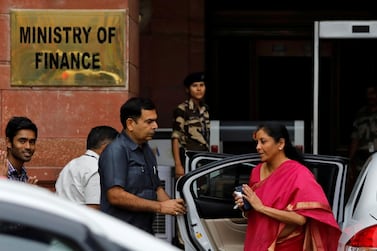Business has been going well for Hyderabad education technology start-up 3RDFlix, its founders say, despite a broader slowdown plaguing India's economy.
The company secured $5 million (Dh18.36m) in funding three weeks ago, revenues are set to grow by 100 per cent this financial year over the previous year and the company is creating dozens of new jobs, says Charu Noheria, co-founder of 3RDFlix, which was set up five years ago,
“India's start-up ecosystem has matured a lot,” says Ms Noheria. “Everybody's figured out that it's not a short-term game.”
Many start-ups in India have a similar story to tell, claiming they are flourishing despite a slowdown in the country's economic growth, which tumbled to a six-year low of 5 per cent in the April to June quarter, according to government data. That compared to 8 per cent in the same quarter last year, with economists attributing the country's slowing growth to weakening private investment and consumer demand. A 500 billion Indian rupee (Dh25.85bn) stimulus package aimed at boosting export promotion was announced by finance minister Nirmala Sitharaman on Saturday.
Figures from Venture Intelligence, a Chennai start-up data analysis firm, show that despite the difficult economic backdrop, a record $6bn of venture capital was invested in Indian start-ups in the first eight months of 2019, up from $3.5bn during the same period a year ago.
“India has a young population and an average age that's much lower compared to other ageing populations and that's a key reason why a great number of start-ups are coming up in India,” says GV Aniruddh, associate director of start-ups and innovation at advisory firm Grant Thornton India. “The economy will return to the uptrend. The overall funding has gone up and there are lot of foreign funds coming to India.”
Start-up entrepreneurs are also being helped by surging smartphone and internet use in the country, creating new opportunities to tap in the technology space.
The Indian government is also playing a more active role in encouraging start-ups, with an initiative in place called Startup India, a campaign rolled out in 2015 aimed at improving the environment for new ventures through funding and tax breaks.
The relatively positive market for start-ups in India has seen some big-ticket investments in recent weeks.
Last month, social commerce company Meesho in Bangalore raised $125m in a funding round led by South Africa's Naspers. The same month, Indian regional language social network platform, ShareChat, closed a $100m funding round led by Twitter.
This flow of capital is helping start-ups create employment opportunities. A recent survey by LinkedIn found the top 25 start-ups in India, which include hospitality company company Oyo and Bangalore wellness start-up CureFit, collectively created 18,000 jobs over the past year with another 19,000 opportunities in the pipeline for the next 12 months.
Supaul Chanda, the business head at TeamLease, a recruitment firm, has noticed brisk hiring activity in the start-up space.
"I see a lot of hiring trends happening on the start-up front here in India, particularly over the past three quarters,” says Mr Chanda “And that's actually an offset from the regular hiring trend.”
TeamLease's hiring for start-ups has increased approximately 45 per cent this year over last year, he says, a trend partly reflected by the increase in start-ups on its books.
Financial technology and engineering start-ups are particularly active at the moment, he says, adding that it is difficult finding the right talent to fill the heightened demand for these roles because of a “skills gap” in the country.
This is set against rising unemployment rates in India overall, with a number of businesses reportedly cutting jobs, particularly consumer goods companies affected by a liquidity crunch and less credit being available. India's unemployment rate hit a three-year high of 8.4 per cent last month, according to think tank Centre for Monitoring Indian Economy. Reports also suggest up to 350,000 jobs have been lost in the auto industry since April, as car sales stalled.

Haber, a technology start-up in the city of Pune, which uses artificial intelligence to help companies analyse data, is among many new ventures in India bucking the employment trend by actively hiring. With an existing team of 50, it is creating about 10 new positions every month as it ploughs ahead with expansion plans, says Vipin Raghavan, Haber's co-founder and chief executive.
The company recently opened a new office in Bangalore and set up a plant in Pune to manufacture its own hardware. The expansion has been facilitated by a Series A funding round of $6.1m raised from an American venture capital firm a couple of months ago.
“There's still a lot of capital spending in the manufacturing sector in India and people are expanding their factory capacities, especially in metals and mining, food and beverage, and those are some of the industry verticals we cater to, although there's definitely some slowdown in the consumer space,” says Mr Raghavan. “We also have plans to go international.”
He adds that “from a funding standpoint, especially the venture capital community, I've seen an uptick since we've closed our funding and I have friends who are founders and seen other start-ups close rounds as well”.
Jonathan Bill, chief executive and co-founder of CreditMate, a Mumbai FinTech firm, is also upbeat about India's start-up scene.
“India's second time around entrepreneurs are raising funding rounds that rival Silicon Valley,” he says. “Big successes have flowed from addressing large systemic issues in India [and] those with solid, realistic plans and the ability to scale funding [are raising money] faster and on better terms than ever before”.
Meanwhile, investors say there are enormous opportunities in India's start-up scene, as the market matures.
“The economic slowdown is a hiccup in the entire long term growth story of India,” says Sunil Goyal, managing director and fund manager at YourNest Venture Capital in Gurgaon, north India. YourNest recently invested in education technology company 3RDFlix, as it focuses on investment in the tech sector.
“These are the periods to pick very high quality products for investment so that by the time we are ready for exit from those investments, the economy is booming,” says Mr Goyal.
He says the firm expects to make at least four to five investments in 2018 compared to one last year.
But the start-up sector is not immune to challenges.
Mr Aniruddh at Grant Thornton says a high number of start-ups completely fail in India and seed funding - to help brand new ventures get off the ground - appears difficult to raise at the moment.
Akash Sachdev, co-founder and chief of marketing at RebelRides, a luxury motorcycle rental company, says “it’s not the most buoyant scene, but not the most disappointing either”.
Mr Sachdev has noticed that while “there has been an improvement in late-stage investments, early-stage angel and seed investments are happening but are much more dotted”.
Ms Noheria, however, believes investors have woken up to the potential of India and are keeping a close eye on the market for the chance to find the next billion-dollar company in the making.
“Investors have missed opportunities over the last few years in India,” says Ms Noheria. “They don't want to miss out on the next big success story.”








